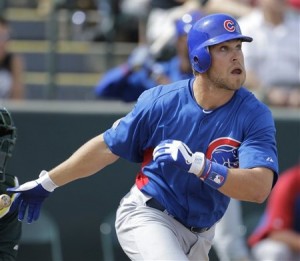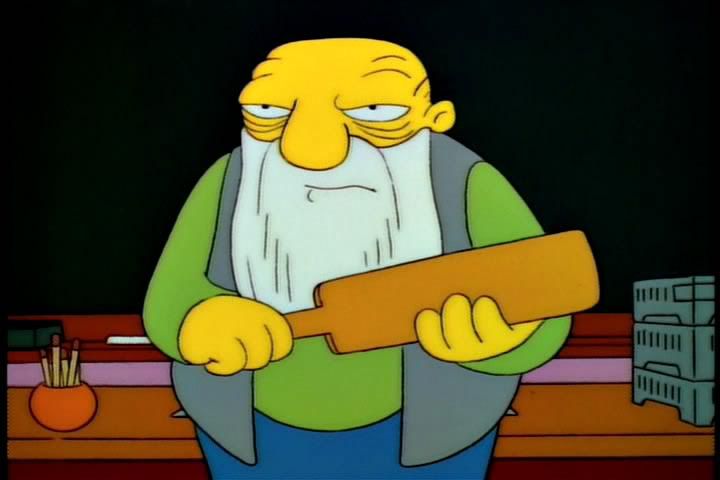 A lot of things have been said and written about him over the last year so I thought a closer look at Brett Jackson was appropriate. We'll also take a closer look at Josh Vitters later on.
A lot of things have been said and written about him over the last year so I thought a closer look at Brett Jackson was appropriate. We'll also take a closer look at Josh Vitters later on.
Brett Jackson has come to be defined by his strikeouts and will continue to be defined that way until he shows he can make contact more frequenty than he has. Strikeouts have been a problem for him going all the way back to his college days. Jackson's strikeout rate at each level where he's had 100 or more plate appearances are below.
- 2009 A-: 18.9%, 106 PA
- 2009 A: 25%, 128 PA
- 2010 A+: 20.2%, 312 PA
- 2010 AA: 23.5%, 268 PA
- 2011 AA: 24.9%, 297 PA
- 2011 AAA: 29.8%, 215 PA
- 2012 AAA: 33.8%, 467 PA
- 2012 MLB: 41.5%, 142 PA
As a college draft pick, Brett Jackson's 18.9% strikeout rate in short-season Boise was especially high even though it's only 18.9%. We see by the time he's really at an age appropriate level for prospects his strikeout rate increased to 23.5% (roughly 24.2% over his 500+ PA at AA). At AA it increased it even more, which is what we'd expect and at the MLB level it was absurd.
Let's get one thing clear at this point: Brett Jackson is not going to have any long-term success at the MLB level if his strikeout rate is as high or even nearly as high as it was at the MLB level in 2012.
We should expect that rate to regress next season just because it's quite unlikely his true talent strikeout rate is over 40%.
I didn't even want to focus on strikeouts as much as I have here. There is more to a player than one skill. Few players are great at everthing. Players combine various skills at the MLB level and even for really good players these skill levels can vary. Aramis Ramirez was a very good hitter, but rather poor defensively and and he was also bad on the bases. He made up for his weaknesses by hitting for average, power and being better than average at getting on base. Most Major League players will have varying skill sets.
Brett Jackson will probably never be very good at hitting for average. Even if his strikeout rate drops considerably, it's still going to be high. As a result, he will hit for a low average unless he can somehow sustain a high batting average on balls in play (BABIP). And we know BABIP tends to be around .300 so I think we can safely say that Jackson won't be hitting for a high average.
In 2011 I was thinking Brett Jackson might hit about .240/.340/.440 at he MLB level with above average defense at a premium position. I'm not ready to adjust that downard just yet.
Brett Jackson does do some things well. Lost in all the talk about his strikeouts is talk about what those things are. He's always gotten on base in the minor leagues. His minor league OBP was 97 points higher than his batting average. He's very good at getting on base via walk.
Despite a putrid .175 batting average at the MLB level last season, his OBP was .303. National League average was .318. Among players with 140 or more plate appearances last season, Brett Jackson's 15.5% walk rate was 5th best in baseball. We can expect his walk rate to regress just like we can his strikeout rate, but Jackson is very good at getting on base without a base hit.
His .167 ISO isn't great or anything, but during his first taste of big league action, it's better than I expected. He does have some power to go along with his ability to get on base. He also plays defense well according to many scouts.
If Jackson could cut the strikeout rate down to a more manageable level, I still think there's a very good chance he can be a productive MLB player.
The best case scenario for Jackson is that he overcomes his strikeout issues and goes on to become the star player that he is capable of becoming. Though he'll never be a contact hitter and will have higher than usual strikeout rates, he could lower it enough to become a very good player.
Time isn't necessarily on his side at this point. He turned 24 in early August so we shouldn't expect his skill level to improve all that much at this point. That being said, there's really only one issue holding him back. Dale Sveum seems confident they've fixed the issues with his swing so it will be interesting to see how he does in 2013. He should be the everyday starter, but will probably have to earn the job in spring training.
The worst case scenario is that his strikeout rate continues to be ridiculously high, though not at all likely to be as high as in 2012. If that happens, he'll probably be relegated to a bench role. If he can excel against right handers, he could be effective in that role. He won't be as valuable as we once thought he could be, but there's still value in a left handed hitting bench player who can play all three outfield spots, hit for power and draw walks.
That's especially true considering that role would mean that a higher percentage of his plate appearances would come against right handed pitchers.

Comments
aside: http://obstructedview.net/commentary-and-analysis/darwin-barney-regresssion-candidate.html
dmick89Quote Reply
I think Barney’s superb with the glove, but I agree with the article. It’s silly to expect him to be worth anywhere near 3.5 wins defensively year after year.
MishQuote Reply
@ Mish:

Post in the wrong thread? That’s a paddlin’
WaLiQuote Reply
Thank God for Sammy Sosa.
Aisle424Quote Reply
@ Aisle424:
Amen.
Rice CubeQuote Reply
I am upset and slightly angry at the anti-Sosa sentiment after the SammyTV aired and felt the need to vent. Thank you for reading this comment.
Rice CubeQuote Reply
New Shit (sorry dmick)
MylesQuote Reply
He’s a legend! 😀
RickQuote Reply